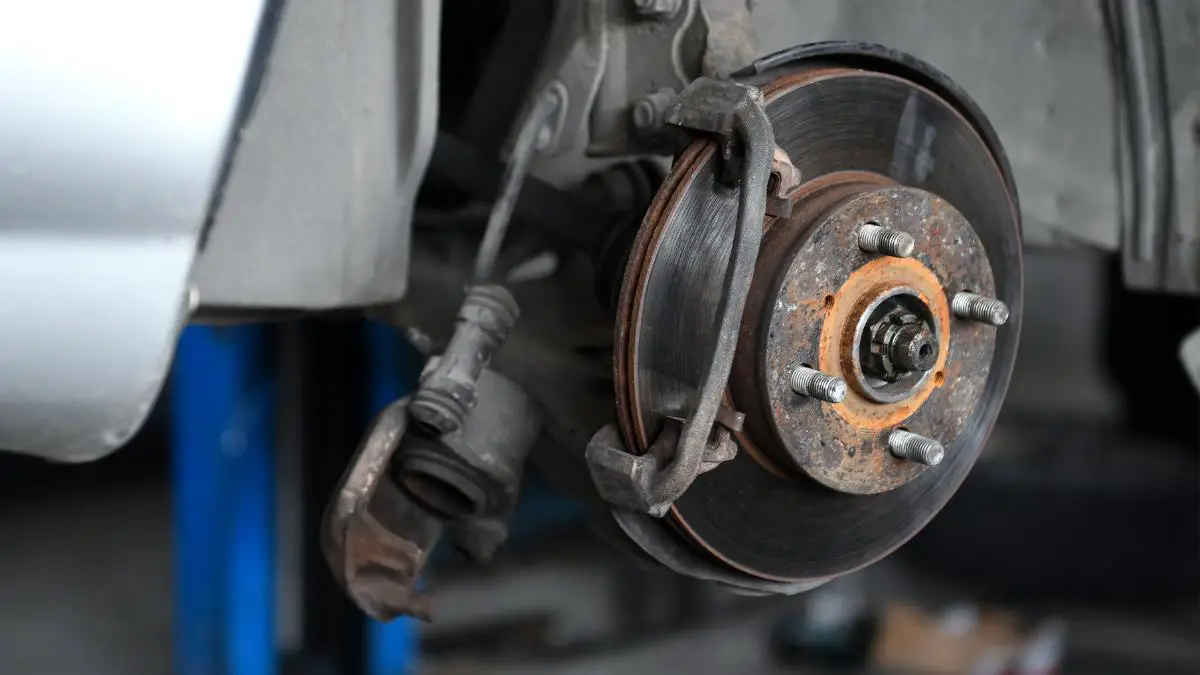Are you hearing a grinding noise when braking? Then it’s something you shouldn’t ignore! This is a common issue that many drivers experience at some point and is typically considered to be a more severe symptom than squeaking brakes. That’s why when you hear this type of braking noise, it’s important to address it promptly to ensure the safety and reliability of your vehicle. But what causes grinding noise when braking, and what can you do about it?
Today, we’ll explore just that! So whether you’re a DIY mechanic or just a car owner, we’ve got you covered with simple, easy-to-follow guidance and tips so you can take the necessary steps to fix the problem and get back on the road confidently.
Let’s get started!
Why Are My Brakes Grinding?
The most common cause of a grinding noise when braking is due to excessively worn brake pads. This means the metal backing of the brake pad is grinding against the rotor as you hit the brakes. Not only does this lead to reduced braking performance, but it will inevitably damage your rotors and can in the worst case lead to brake failure.
The good news is that depending on the situation when the grinding noise occurs, it can often help pinpoint the cause. So what do I mean by that? Well, there are typically three situations where this happens.
The first and most common situation is when you press the brakes while driving and slowing down. In this case, 9 out of 10 times, the brake pads or brake rotors are to be blamed.
The second situation is if there’s a grinding noise from the brakes while driving at a steady speed, even when not braking! In this case, something has likely lodged between the caliper and the rotor, such as dirt, debris, and sometimes even worn-out or damaged brake shims.
Finally, if you normally brake and feel the pedal rattle while the brakes make a grinding noise, it’s likely not because of the brake pads, rotors, or anything stuck in between the brake caliper. Instead, you want to pay attention to the Anti-Lock Braking System (ABS).
However, this is completely normal and means the ABS engages if you, for example, slammed the brakes during an emergency brake that would’ve locked the wheels.
But in rare cases, the ABS can engage during normal brakes. But usually, when this happens, the grinding goes away after a while, followed by a warning light, such as the check engine light popping up on the dashboard. If this is the case, you can pull the trouble codes, which often give you the answer to what’s happening.
5 Causes of Grinding Noise When Braking
Now that you know more about the different situations where the grinding noise when braking may occur, you’re one step closer to fixing the issue. But to understand the problem even further, let’s take a closer look at the possible causes.
1. Worn Brake Pads
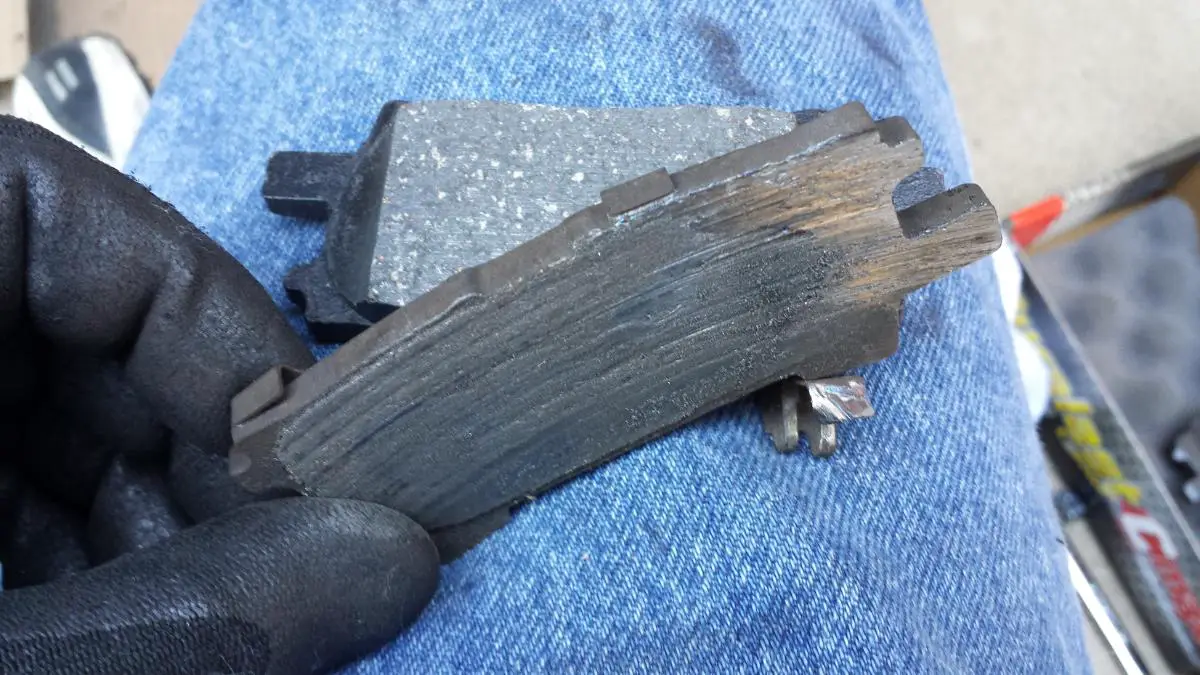
As mentioned, one of the most common causes of grinding noise when braking is excessively worn brake pads. On one side of the brake pads, there is a friction material that generates the necessary friction to stop your vehicle. But over time, this layer eventually becomes too thin to stop the car effectively.
However, before this happens, most brake pads have a wear indicator that alerts the driver with a squealing or squeaking sound when the brake pads have worn down to a certain level and need to be replaced.
This squealing or squeaking sound is often the first sign associated with worn brakes and usually means there are a couple of millimeters of friction material left. So if you instead hear a grinding noise when braking, chances are that the brake pads have worn down to the point where they rub against the rotors metal-to-metal.
If this is the case, you may experience reduced braking performance and vibrations in the brake pedal. It will also inevitably cause damage to the brake rotors. This is why it’s important to quickly address the issue and replace any worn brake pads as soon as possible, preferably before the grinding noises occur.
2. Dirt or Debris Stuck Between the Rotor And Caliper
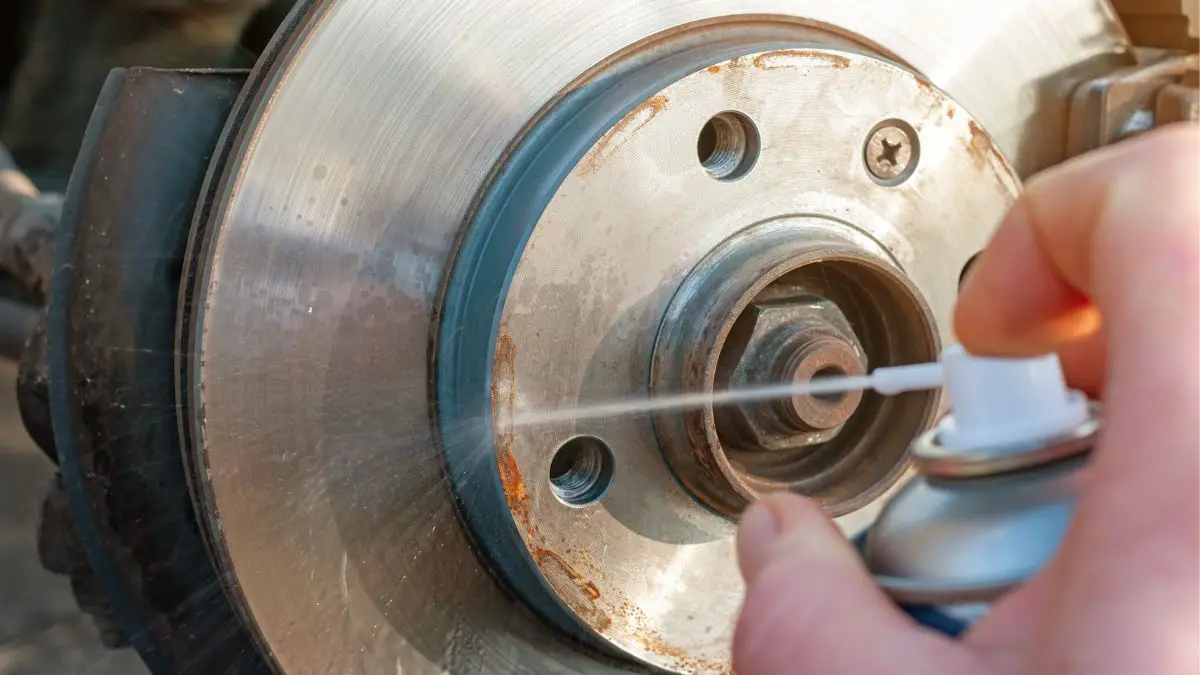
If you get something stuck between the brake rotor and brake caliper it can cause a number of issues, including grinding brakes, vibration, and reduced braking performance. Small stones, debris, and dirt are often the cause to this and the risk increases if you drive a lot on gravel roads or off-road.
If left unchecked, the foreign object can cause further damage to the brake pads, rotors, and calipers, which can be costly to repair.
In some cases, you may get the stuck item dislodged by moving the vehicle forward and backward. Other times, you’ll need to dismantle the brake pads and caliper to be able to clean away what’s stuck.
Also read: Sticking Brake Calipers: Symptoms, Causes & How to Fix It
3. Worn or Rusty Brake Rotors
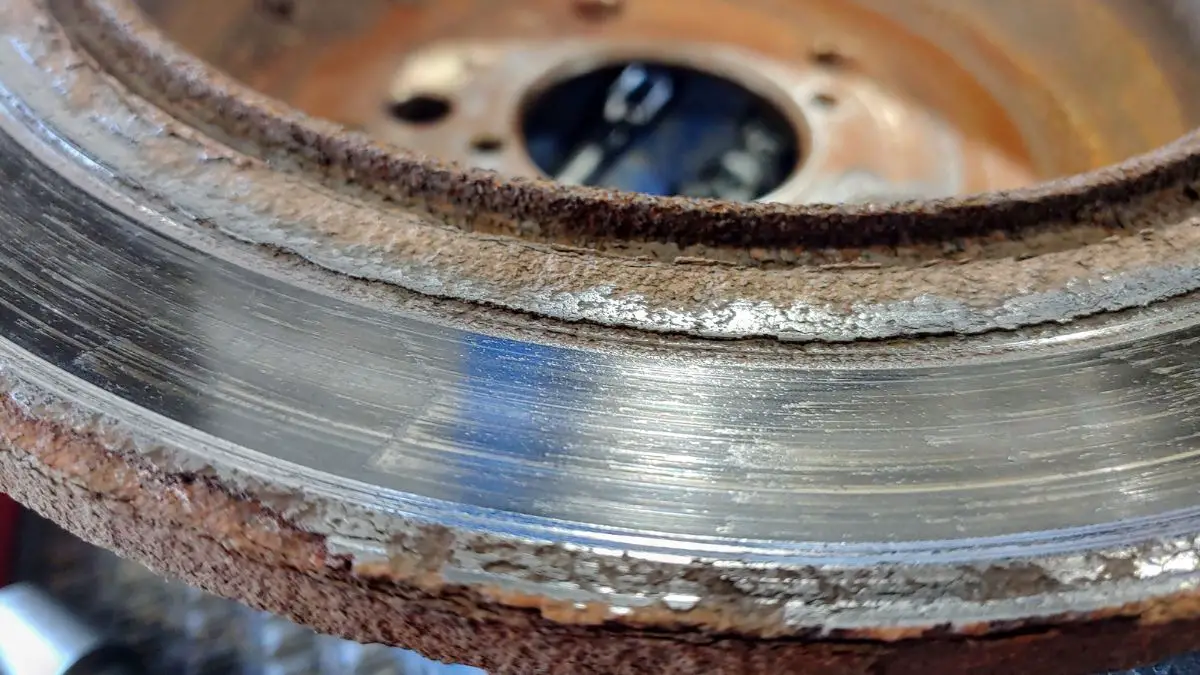
In some cases, if a car makes grinding noise when braking it may be caused by worn or uneven brake rotors. When rotors become worn or rusty, they can become uneven and cause the brake pads to make a grinding or scraping noise as they rub against the rotor surface. In addition, if the rotors have become too thin or have developed deep grooves or other damage, they may also produce grinding noises when the brakes are applied.
However, if the unpleasant noise is due to a small amount of rust on brake rotors, it’s generally not a cause for concern. This often happens when a car is not driven enough or for an extended period of time and will normally go away after braking a few times.
But if the rust is severe, it’s generally a good idea to have a mechanic inspect the brakes to determine the appropriate action. Depending on the extent of the wear, rust, and overall condition, the rotors may need to be resurfaced or replaced in order to fix the problem.
4. Broken or Worn-out Brake Pad Shims
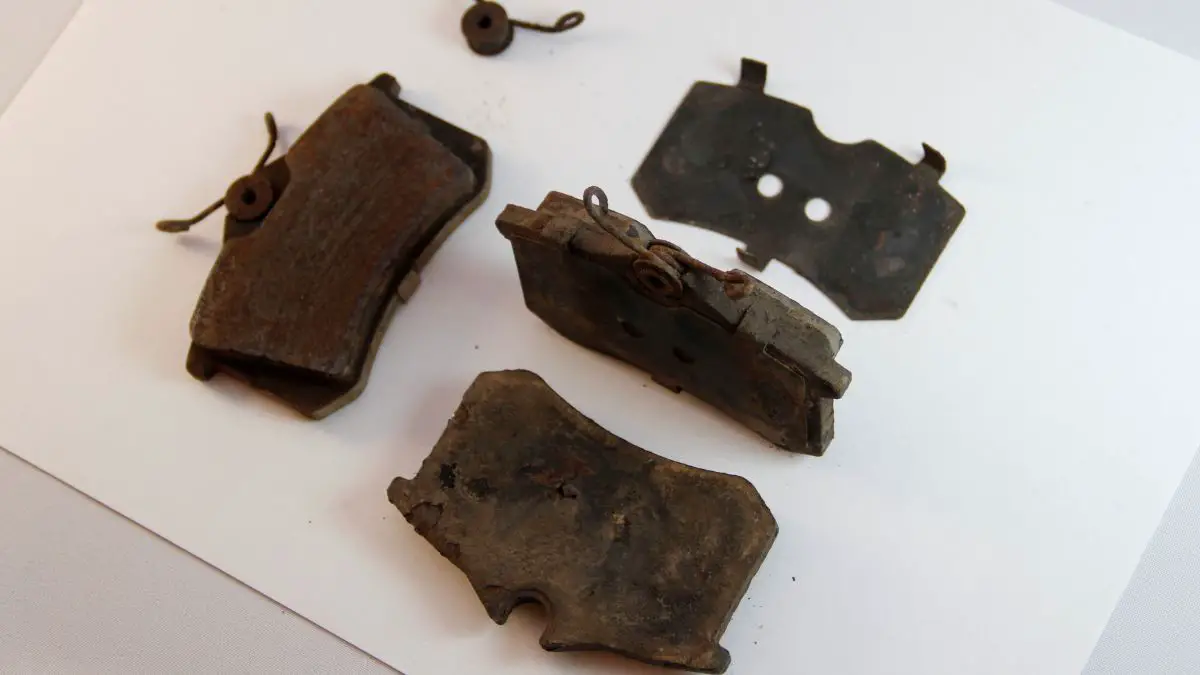
Brake pad shims are small pieces of metal or other materials that are attached to the friction pad backing. Its purpose is to absorb small vibrations when the brakes are applied by providing a barrier between the brake pad and the caliper, making your driving experience quieter and more enjoyable.
However, if the brake pad shims become worn out, damaged, and sometimes even installed incorrectly, it can cause a number of problems, including a squealing or grinding noise when the brakes are applied.
For this reason, you’ll want to install new shims when the brakes are replaced and ensure that the installation is properly done.
5. Faulty Wheel Bearing
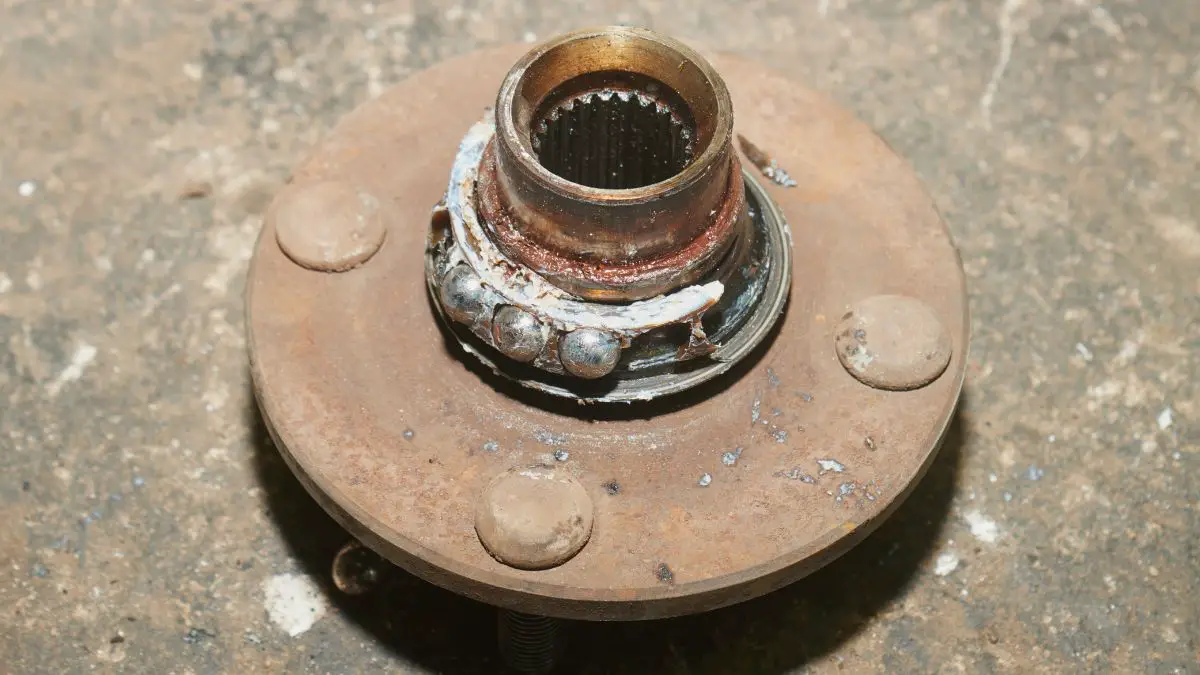
While this is likely not the cause, it’s still possible for a faulty wheel bearing to produce grinding noises when you brake. However, if this is the case, you’ll often hear a grinding or growling noise coming from the wheel while driving.
The noise also tends to get worse as you turn since the forces acting on the bearing are greater when the vehicle is turning. So if the brakes are only grinding when braking, it is more likely that the noise is caused by something else in the braking system.
How to Diagnose the Cause of Grinding Noise When Braking
With a few different potential problems, it can be challenging trying to figure out exactly what’s going on and why your brakes are grinding. In some cases, it may be necessary to seek the help of a professional mechanic. But before doing that, there are a few things you can do to inspect the brakes yourself.
Start by doing a visual inspection to rule out some easy-to-spot problems. And while you might think the grinding noise is coming from a particular brake, we recommend playing it safe by checking all the brakes. This also gives you a good overview of the overall condition of your brakes.
When checking your brakes, you’ll want to make sure nothing is lodged between the pads and the rotor and that there’s enough pad life left on the brake pad. In addition, look for any abnormal wear or scoring on the rotors and also check the calipers’ condition.
From there, consider if you recently had new brakes installed. If so, the problem could be with the installation or the brake pads themselves, such as a broken pad shim.
If you still can’t see any reason for causing the noise, it’s worth checking the tires for uneven wear, especially if you notice vibrations while driving. And if both checks in, it points toward a faulty wheel bearing.
If everything looks good while you’re checking it out, the next thing to do is to either pull trouble codes with the help of an OBD2 reader or take your car to a professional mechanic for an accurate diagnosis.
As the brakes are crucial for your safety, as well as your passengers and other road users, you’ll want to know they are in tip-top shape rather than just assuming they are.
How to Fix Grinding Noise When Braking
The level of difficulty in fixing grinding brakes can vary depending on the cause of the problem and the person’s knowledge and experience with automotive repair. For example, if worn brake pads cause the problem, it may be relatively simple for someone with some basic mechanical experience to replace the pads themselves.
Cleaning off debris between the pads and rotor and fixing worn brake pads require using a jack, removing the wheel, using a c-clamp to push the caliper piston back, removing the caliper, and properly installing the brake pads back.
Replacing a rotor also requires a similar process, but you’ll also need to remove the bracket holding the caliper in place. After doing so, you should be able to remove the rotor as long as it’s not stuck because of corrosion.
On the other hand, if the problem is caused by a more complex issue, such as a faulty wheel bearing, it may be more difficult for someone who is not well-versed in automotive repair to fix it.
In general, it’s important to understand the problem and the necessary repair before attempting to fix a grinding noise from the brakes.
If you’re unsure of what’s causing the problem or how to fix it, it’s always best to consult a professional mechanic. They have the knowledge, tools, and experience to properly diagnose and repair any issues with your braking system.
How Much Does It Cost to Fix Grinding Brakes?
It’s difficult to provide an accurate cost estimate without knowing the severity of the problem. But the average cost to replace the brake pads is about $150 per axle. With new brake rotors, expect to pay around $200 per axle. However, if there’s something stuck in between the caliper, you might not have to spend a dime.
In general, brake repair costs can vary significantly depending on the make and model of your vehicle, the severity of the issue, and the type of repair that is needed.
For example, if the problem is caused by severe rust, other brake components might be in bad condition and also need a replacement, such as the calipers. This will inevitably increase the total repair costs.
If you have already figured out what is causing the grinding brakes, it’s always a good idea to get a few estimates from different mechanics or repair shops to get a better idea of the costs involved.
Also read: How Long Does It Take To Change Brakes? (Pads & Rotors)
Frequently Asked Questions
Is It Safe To Drive If My Brakes Are Grinding?
It’s not safe to drive a vehicle with grinding brakes. Grinding brakes may indicate a serious issue with the brake system and, if not addressed promptly, can result in further damage or even brake failure. Therefore, it’s important to have grinding brakes looked at and repaired as soon as possible to avoid potential dangers on the road. While waiting for repair, it’s best to avoid driving the vehicle at all.
How Long Can I Drive On Grinding Brakes?
If your brakes are grinding, you shouldn’t drive at all. In most cases, grinding brakes means the brake pads have worn down to the point where the metal backing of the pads is coming into contact with the brake rotors, which is dangerous. However, even if the pads are fine, grinding brakes indicate that there’s something wrong that needs immediate attention.
Final Thoughts – Grinding Brakes
If you hear a grinding noise when braking, it’s time to take action immediately. This unpleasant warning sound usually means your brake pads have done way past their last miles and that they need to be replaced promptly.
Whether it’s the brake pads, worn rotors, or a small stone stuck in between the brake caliper, you still need to thoroughly get to the bottom of the cause of the grinding brakes. And if you feel the job is above your head, don’t hesitate to take your car to a professional mechanic.
Driving with faulty brakes is a serious risk to your safety and the safety of others on the road. And neglecting to address grinding noises or other issues with your brakes is not only irresponsible, but it can also end up costing you much more in the long run.

